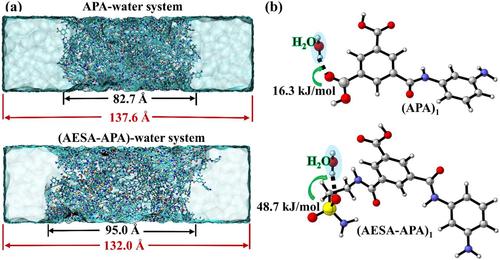Molecular dynamics study on the structure and antifouling performance of aromatic polyamide membrane with sulfonamide group
Aromatic polyamide (APA)based reverse osmosis (RO) membrane is commonly used for desalination and drinking water purification due to its high water flux, high salt rejection, structural robustness, and environmental friendliness. Membrane fouling is one of the most serious problems in its practical application. In this study, two reliable atomistic models of c oss-linked APA and APA modified with 2-aminoethanesulfonamide
molecule (AESA-APA) membranes were constructed. The structure,
water dynamic, and antifouling performance were investigated in detail via molecular dynamic simulation and density functional theory. Compared with APA membrane, the hydrophilicity, water flux, and antifouling performance of AESA-APA membrane are improved by grafting AESA
group. The simulated results reveal that a protective water shell is formed because of the strong hydrophilicity of the AESA-APA membrane,
and the foulant sodium alginate (SA) is difficult to get into the interior region of the AESA-APA membrane. The potential mean force analysis
demonstrates that it is easier for SA to wash away from the surface of AESA-APA membrane than APA membrane in practical application. The
comprehensive understanding on the structure and antifouling property of the sulfonamide-modified APA membrane is beneficial to the
development of novel and high-performance APA-based RO membranes.

Hu, Yayun, et al. "Molecular dynamics study on the structure and antifouling performance of aromatic polyamide membrane with sulfonamide group." Materials Today Communications 35 (2023): 105674.